#shopify api integration
Explore tagged Tumblr posts
Text
Set Up Shopify API Integration
How to Set Up Your Shopify API Integration with Digiluxo 🛒💻
Body: Hey e-commerce entrepreneurs! 🌟 Ready to supercharge your Shopify store and streamline your business operations? Integrating the Shopify API can unlock powerful tools for automation, customization, and enhanced functionality.
💡 Why integrate with Shopify's API?
Automate routine tasks and save time ⏳
Enhance your store's features and user experience 📈
Seamlessly connect third-party apps for a smoother workflow 🔗
Digiluxo has put together an easy-to-follow guide to help you set up your Shopify API integration. Whether you're just starting or looking to level up, this resource is your go-to for simplifying the process and boosting your store's potential.
👉 Read the full guide here.
#ShopifyAPI #EcommerceTips #ShopifyIntegration #Digiluxo #OnlineBusiness #Automation #ShopifyDev #TechSolutions #EntrepreneurLife
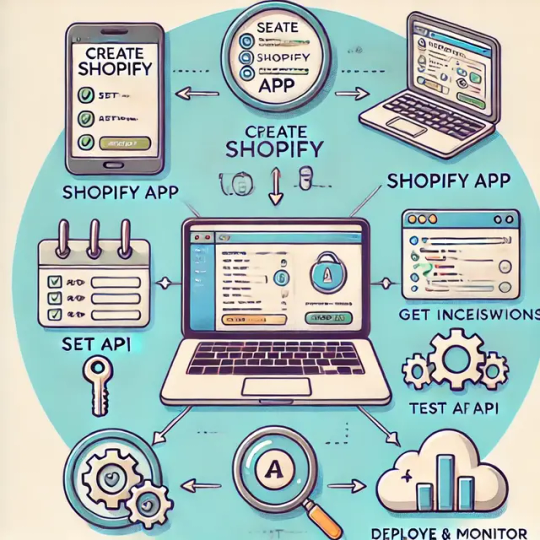
0 notes
Text
How to Use Shopify
Shopify has quickly become one of the most popular commerce platforms on the web, and business owners across all verticals use Shopify to sell online. If you’re thinking about starting a business, Shopify can be a wonderful tool to create an online store, and its easy-to-use features and interface make it the perfect solution for small business owners, creators and solo entrepreneurs.
Below are some tips to get the most out of your experience with Shopify:
Take Advantage of Shopify’s APIs
Shopify provides access to an application programming interface (API) that can extend the functionality of the platform’s features. For example, Shopify API integration can allow you to import store data into Google Sheets directly, making it faster and easier to create spreadsheets for sales data. You can also rely on Shopify API integration to pull shipping data from orders.
You do need a developer account to take advantage of a Shopify API, but this is fairly easy to set up. You will also need to install add-ons in your store for the various API features you want to take advantage of, but once again, this is a fairly simple process once you’re logged into your store.
Categorize Your Products
Shopify allows business owners to separate products into categories. This makes it easier for customers to view and search for products, but it can also help business owners keep up with inventory and sales.
When you create categories of products, you also have the chance to see data about what types of products sell the most during certain times of the week, month or year. This data can help you craft marketing plans and target sales for maximum impact.
Select the Right Theme
Shopify stores use themes to stylize the appearance of your storefront on the web. Choosing the right theme can make a big difference in a customer’s perception of your brand, so take some time to look through various themes before deciding on one. It’s also a good idea to review branding research to see what types of colors and images are most effective in your industry.
Read a similar article about Salesforce integration here at this page.
0 notes
Text
Shopify API Integration Services
Boost your e-commerce success with expert Shopify API Integration services from Shopify App Developers to elevate your eCommerce business’ potential. Shopify API Integration
0 notes
Text
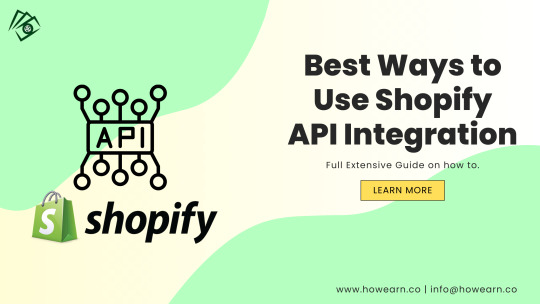
What is Shopify API & How to Use It? | A Guide to Integration and Usage
The term “Shopify API” refers to the Application Programming Interface offered by the well-known e-commerce platform Shopify. A set of guidelines and procedures known as an API enables interaction and communication between various software programmes.
Developers can create plugins, integrations, and applications that can communicate with a Shopify store using the Shopify API. It offers a way to access and work with various Shopify store data, including items, orders, clients, inventory, and more. Developers can build unique solutions, automate processes, and increase the functionality of a Shopify store using the Shopify API.
1. Understanding Shopify API
The Shopify API (Application Programming Interface) acts as a conduit for data exchange and seamless integration between your Shopify store and third-party applications. It gives developers and business owners the ability to increase the functionality of their stores and develop unique solutions to suit their particular requirements.
2. Key Benefits of Shopify API
Utilizing Shopify API offers several advantages for your business:
Custom Integrations: Shopify API allows you to integrate your store with third-party applications, payment gateways, and other services, enabling you to streamline operations and enhance the customer experience.
Automated Processes: By leveraging the power of Shopify API, you can automate various processes such as inventory management, order fulfillment, and customer support, saving time and reducing manual errors.
Data Accessibility: The API provides access to a wealth of data from your Shopify store, including products, orders, customers, and more. This data can be leveraged for reporting, analysis, and building personalized experiences for your customers.
3. Getting Started with Shopify API
To begin using Shopify API, follow these steps:
Generate API Credentials: From your Shopify store admin, navigate to the “Apps” section and create a private app. This will generate the API key and password required for authentication.
Choose API Version: Shopify API has different versions, each with its own features and capabilities. Select the appropriate version based on your requirements.
Explore API Documentation: Shopify provides extensive documentation and guides that cover various API endpoints, request formats, and authentication...
Read the Full Guide Here: https://howearn.co/what-is-shopify-api-how-to-use-it-a-guide-to-integration-and-usage/
0 notes
Text
Shopify Commerce APP Plugin Integration Tutorial with API SDK and Libraries
Shopify offers ready to use apps or plugins for 3rd party services like payment, ERP, CRM, search, reviews & rating etc. Shopify Plus is super-fast. It allows custom-code promotions, which have been extremely effective. You can integrate existing systems, apps, plugins like ERP or CRM with Shopify APIs, SDKs or Shopify Plus Partners. You can easily migrate your customer, product, and order data…

View On WordPress
#ecommerce#ecommerce business#shopify#shopify admin api#shopify admin api node js#shopify admin api tutorial#shopify api integration#shopify api postman#shopify api tutorial#shopify app#shopify app development#shopify app development node js#shopify app development tutorial#shopify dropshipping#shopify integration#shopify plugin development#shopify plugin development tutorial#shopify plugin tutorial#shopify plugins#shopify store#shopify tutorial
0 notes
Text
How do you integrate an API into Shopify?
Integrating an API into a Shopify store typically involves creating a custom app, which can then interact with the API and add functionality to your store. Here's a step-by-step guide
1. Create a Shopify Developer AccountBefore you begin, you'll need a Shopify Developer account. Sign up for a free account at https://partners.shopify.com/signup.
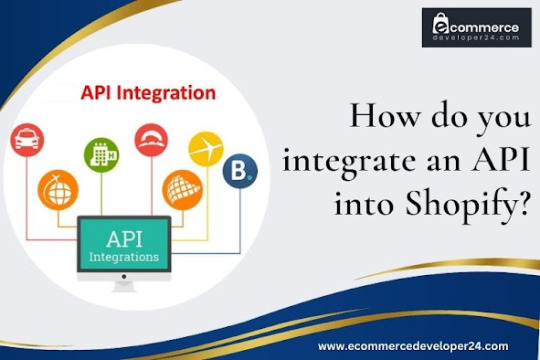
2. Create a new custom app
Create a new custom app once you have a Developer account:
Log in to your Shopify Partner Dashboard using your login credentials.
In the sidebar menu, click on "Apps".
On the "Apps" page, click on the "Create app" button.
Next, select the "Custom app" option from the available choices.
Click on the "Create app" button once again.
Fill out all the required information for your custom app, such as the app name and app URL, in the appropriate fields.
Once you have entered all the necessary information, click on the "Create app" button one final time to complete the process.
3. Set up API credentials
To interact with the Shopify API Integration or any external API, your app will need the appropriate API credentials:
In your custom app's page, click on "App setup."
Scroll down the "API keys and scopes" section.
Click "Generate API credentials."
Fill in the required information, such as API key description and scopes, and click "Generate."
Source
0 notes
Text
Woxro: The Bright Head in the Lead of Ecommerce Development
Woxro is one of the highest level e-commerce development companies in the constantly changing digital economy. Woxro assures cutting-edge solutions for businesses with the sophisticated requirement of today's digital economy. Whether it's about B2B and B2C platforms or the most seamless integration, or simply a custom-built solution, the online business experiences get ignited through Woxro's services. Backed with the attitude of innovation and commitment towards making their clients successful, Woxro helps companies make strong digital platforms along with competitive markets. Check out these are the core e-commerce development services by which Woxro comes forward to be a preferred partner for businesses wanting to breathe new life into their online presence. Woxro is the leading ecommerce development company in India and is providing top notch services and solutions for you.

B2B Platform Development
The B2B interaction is at the heart of modern commerce; it has built B2B platforms that make such interactions easy and hassle-free. B2B marketplaces help a company reach its suppliers, shortlist potential partnerships, and make the transactions all from one centralized place. Woxro's B2B platforms are wide-ranging and ensure that customers experience security, reliability, and ease of use in all business operations in order to create confidence and efficient workflows. Woxro's B2B solutions are equipped with real-time inventory management, automated processes, and advanced analytics, meaning businesses can work efficiently and have valuable relationships that last long.
B2C Platform Development
Through ease-of-use, online shops to offer products for shopping, Woxro's B2C platform development services help businesses reach their customers and interact directly with them. Designed to convert visitors into loyal customers, Woxro's B2C platforms include all the comprehensive tools for managing products, processing secure payments, and engaging in more personalized experiences for shopping. Each is optimized to give an easy, enjoyable experience to the user as businesses stretch their reach to the customer, marketing being directed, and giving an enjoyable shopping experience that creates a sale and brand loyalty.

Platform Migration
Moving out from the outdated systems to modern scalable platforms often marks the beginning for businesses that want to remain competitive. Woxro professionals successfully migrate complexly numerous business operations from less than the minimum level of disruption. Woxro takes cautious control of data migration, system configuration, and testing processes while making the move to become more distant in terms of on-premise systems to cloud infrastructure, updating legacy technology, or changing platforms. When businesses engage with Woxro, they embrace the latest technologies, realize cost savings on operations, and boost the performance of the system with business continuity and efficiency intact.
Custom-Designed Platform Development
Woxro realises that every business is unique and has custom platform development services that provide bespoke solutions for a specific goal or workflow in place. These platforms are off-the-shelf by definition, designed from the ground up to meet a precise business need. Woxro's custom solutions are scalable and adaptive, allowing businesses to implement proprietary features, streamline workflows, and maximize flexibility. About Woxro's customization innovation integration: It ensures that the platforms continue to grow with the business and, thus, become an excellent basis for long-term growth as well as a competitive edge in the market.
CMS Integration
The integration of a content management system with your e-commerce platform has vast benefits within the operation, ranging from effective product management to advanced SEO capabilities. Woxro's content management system integration services enable businesses to access a single, easy-to-use interface for managing product descriptions, optimizing search content for better search engine rankings, and personalising shopping experiences. CMS integration, therefore, promotes ease of updates while bringing increased online visibility and engagement from customers. CMS integration helps companies create more engaging and dynamic experiences that talk to customers to convert them.
API Integration
API integration is a necessary concept for e-commerce platforms in an interlinked digital world, integrating with third-party applications, payment systems, and other services. Woxro's API integration services provide smoother interoperability between different software applications for easy information sharing and add-on features. Of course, payment gateway, CRM system, and APIs all resolve issues because their performance can grow without getting disconcerting of existing operations, Woxro ensures that. API integration makes the overall functionality and responsiveness of e-commerce platforms robust, flexible, and scalable enough to expand on further expectations.
Why Woxro for ECommerce Development?
At Woxro, you will find industry expertise, innovative technology and, above all, a client-centric approach that seeks tailored solutions for each business. Ecommerce development with Woxro's services is done to cater for the unique needs of every client so as to ensure robust, scalable solutions adapting to changing market demands. Whether it is a B2B, B2C platform, handling platform migrations, or integration with CMS and APIs, Woxro connects with technical pools of expertise in alignment with strategic insight to yield results. Businesses partner with Woxro to achieve advanced tools and custom solutions in enforcing the new path forward through their digital success.

Conclusion
Woxro e-commerce development solutions give businesses the possibility of a powerful and agile web presence. The products offered by Woxro for creating B2C growth strengthen customer engagement, streamline B2B relations, smooth migrates, and unlock API and CMS integrations that facilitate business clients' digital transformation with the platform. Equipping businesses with solutions that solve the challenges of the digital age, creating future-proof, impact-generating e-commerce, to drive business growth and success-all of these Woxro does.
#ecommerce#ecommerce development agency#ecommerce development services#ecommerce development company#ecommerce website development#ecommerce developers#web developers#web development#web graphics#web resources#shopify#woocommerce#online store#smallbusiness#websitedevelopmentcompany#search engine optimization#web design#website design#web hosting#website#social media#content creation#content creator#cms development services#cms#b2b#b2bmarketing#api integration
4 notes
·
View notes
Text
Unlocking the Top Benefits of Shopify API Integration
In today’s fast-paced eCommerce landscape, businesses face increasing challenges like managing multiple sales channels, streamlining order fulfillment, and ensuring customer satisfaction. As your store grows, these tasks can become overwhelming. This is where Shopify API integration steps in, offering powerful solutions that streamline operations and enhance the overall experience for both you and your customers.
With Shopify API, businesses can seamlessly connect their stores to third-party apps, custom solutions, and other critical systems. This integration helps automate repetitive tasks, reduce errors, and improve operational efficiency, all while creating a smoother shopping experience for your customers. In this article, we’ll explore how Shopify API integration can give your business a competitive edge in today’s dynamic market.
What is Shopify API?
At its core, Shopify API is a set of programming tools that allows developers to interact with the Shopify platform. It enables businesses to automatically retrieve and manage data, process orders, and make changes to product details without manual intervention. The API includes various features such as:
- Customers API - Products API - Orders API - Inventory API
By integrating with third-party apps such as CRM systems, ERP software, and marketing platforms, Shopify API allows businesses to automate and customize their eCommerce operations. Whether you run a small online store or a large enterprise, Shopify API provides the flexibility and power to meet your unique needs.
The Key Benefits of Shopify API Integration

1. Automated Inventory Management Managing inventory across multiple platforms can be time-consuming and error-prone. Shopify API helps update stock levels in real-time, eliminating overselling and out-of-stock issues. You get an accurate view of inventory across all sales channels, improving efficiency.
2. Faster Order Fulfillment By integrating with fulfillment services like third-party logistics (3PL) providers, warehouse management systems (WMS), or shipping carriers, Shopify API ensures orders are processed quickly and accurately. This results in faster delivery, higher customer satisfaction, and fewer returns.
3. Personalized Customer Experiences Shopify API connects your store with CRM systems and marketing tools, giving you access to valuable customer data. Use this information to create personalized marketing campaigns and product recommendations, helping to boost engagement and drive conversions.
4. Cross-Platform Synchronization For businesses selling across multiple platforms — like Amazon, eBay, or social media — Shopify API ensures real-time synchronization of product listings, prices, and stock levels. This ensures consistent information across all sales channels and prevents discrepancies.
5. Customized Solutions for Unique Business Needs Every business has its specific requirements. Shopify API allows you to automate tasks like returns, generate custom reports, and manage complex workflows. Whether you offer subscription services, pre-orders, or specialized shipping, Shopify API can handle it all.
6. Simplified Multi-Channel Selling Shopify API integration streamlines selling across various platforms by centralizing data in one place. Manage sales on Amazon, eBay, Facebook, and more, without manually syncing orders and inventory. This helps you focus on expanding your business and reaching new markets.
7. Better Business Intelligence Using Shopify API, businesses can integrate real-time analytics tools to monitor customer behavior, sales performance, and operational efficiency. Access to real-time reporting allows for data-driven decision-making and helps identify growth opportunities.
Important Considerations for Shopify API Integration
Before implementing Shopify API integration, here are a few key points to consider:
- Assess Your Business Needs: Identify your specific requirements and ensure that the API integration solves your business challenges effectively. - Work with Experts: API integration requires technical expertise. Partner with experienced Shopify developers or agencies to ensure seamless integration. - Prioritize Security: Ensure that all API endpoints are secure and data is protected through encryption. - Test and Optimize: After integration, thoroughly test the system and regularly review it to ensure optimal performance. - Stay Updated: Shopify frequently updates its API, so keep track of new features and functionalities to stay ahead of the competition.
Transform Your eCommerce Business with OyeCommerz
At OyeCommerz, we specialize in Shopify API integration services tailored to your business needs. Our experienced team helps you streamline operations, automate tasks, and enhance customer experiences through seamless API integrations. Whether you’re looking to optimize inventory management, enhance multi-channel sales, or personalize customer engagement, OyeCommerz can help you unlock the full potential of Shopify API.
Contact us today to learn how we can transform your eCommerce business through Shopify API integration.
Conclusion
Integrating Shopify API into your business unlocks significant benefits, from improving operational efficiency to creating personalized customer experiences. With powerful customization options and seamless integration with third-party apps, Shopify API allows businesses to streamline operations and scale effortlessly.
Whether you’re automating inventory, simplifying multi-channel selling, or driving data-driven decision-making, Shopify API integration helps your eCommerce business thrive in today’s competitive market. Unlock new growth opportunities with Shopify API, and let OyeCommerz help you make it happen.
0 notes
Text
#shopify web design services#shopify web design company#shopify website development services#shopify web development services#shopify store development services#shopify theme development#shopify custom theme development#API integration shopify#shopify payment integration#shopify API integration services#shopify store help#help with shopify store#shopify developer support#shopify assistance#help with shopify setup#shopify expert help#shopify developer help
1 note
·
View note
Text
Integs Cloud Expands To The US: Empowering Businesses With Cloud ERP Solutions

Integs Cloud Technologies LLC, a leading cloud solutions and services provider, is thrilled to announce its expansion into the US market! Our new US entity is located in Aldie, VA. This exciting move underscores our commitment to delivering best-in-class cloud solutions to businesses across North America.
The US expansion strengthens Integs Cloud’s ability to serve a wider audience, offering a comprehensive suite of services designed to empower businesses in various industries. Whether you’re in manufacturing, IT services, retail, or professional services, Integs Cloud can help you unlock the full potential of cloud technology.
How Integs Cloud Can Help You Grow Your Business?
We offer a comprehensive suite of cloud solutions designed to address the unique needs of businesses in various industries. Here’s how we can unlock your growth potential:
Streamline Operations & Gain Insights: Our expert Oracle NetSuite implementation team helps you optimize workflows, manage inventory effectively, and gain valuable data insights to make informed decisions.
Seamless Data Flow & Automation: Using Celigo Integrator.io, we seamlessly connect NetSuite with your existing critical applications, automating processes and boosting data accuracy. This translates to a significant efficiency gain!
Effortless E-commerce Experience: Our in-depth knowledge of Shopify empowers you to create a frictionless omni-channel experience for your customers, ultimately leading to increased sales and customer satisfaction.
The Benefits Of Choosing Integs Cloud In The US
Why choose Integs Cloud as your trusted cloud partner? We offer several compelling advantages:
Localized Expertise, Global Reach: Your Cloud Solution Partner with a Worldview – Integs Cloud combines its understanding of the US market with its global experience to deliver tailored solutions.
Proven Track Record: We boast a proven track record of successful cloud software implementations, ensuring a smooth transition for your US business.
Seamless US Support & Implementation: Integs Cloud Makes Cloud Software Adoption Easy – We offer dedicated support and implementation services;
Leverage the Cloud Advantage: Competitive Solutions from Integs Cloud – Benefit from cost-effective and secure cloud solutions optimized for the US market.
Unlocking US Growth Potential: How Integs Cloud Empowers Your Business – We understand your unique goals and challenges to help you achieve sustainable growth in the US market
Let’s Get You Cloud-Ready: Take The First Step To Growth With Integs Cloud
Integs Cloud is your one-stop shop for all your cloud solution needs. We’re excited to partner with US businesses and help them experience the transformative power of cloud technology. Integs Cloud is here to be your trusted partner in your cloud journey. Contact us today to schedule a consultation and discuss how our cloud solutions can help you streamline operations, drive growth, and achieve sustainable success!
Integs Cloud’s expansion to the US marks a significant milestone in empowering businesses with cutting-edge Cloud ERP solutions. Stay updated by reading the latest news about this exciting expansion and learn how Integs Cloud can benefit your business.
#CloudERP#NetSuite#Celigo#Shopify#Ecommerce#NorthAmerica#USA#cloudtechnology#empoweringbusinesses#OracleNetSuite#iPaaS#Zoho#Integration#Automation#API#SaaS#Enterprise#Technology#ERP#Software#IntegsCloud#BusinessAutomation#BusinessExpansion#CloudSolutions#DigitalTransformation#TechSolutions#BusinessGrowth#CloudComputing#DigitalInnovation#ITConsulting
0 notes
Text
Elevate your e-commerce with seamless Shopify Plus API integration. Webgarh Solutions, a trusted Shopify Plus development company, ensures expertly crafted, secure, and scalable solutions. Enhance customer experiences and stay competitive in the dynamic world of online retail.
#shopify plus development services#shopify plus developers#shopify plus development#shopify plus development company#webgarh solutions#ecommerce development#api integration#web development#ecommerce solutions
0 notes
Text
Seamless Shopify Third-party API Integration Solutions by CartCoders
Being the best Shopify third-party API integration service provider, CartCoders is your go-to company for all your Shopify development requirements. We ensure a smooth and accurate data flow between Shopify and the integrated systems as well as we handle data synchronization in real-time or through scheduled tasks. Choose our Shopify third-party API integration solutions to improve efficiency, and provide a seamless experience for both merchants and customers.
0 notes
Text
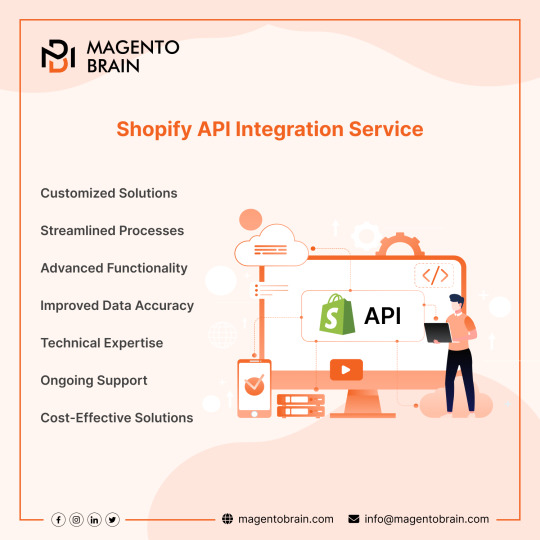
Are you looking to optimize your e-commerce operations on Shopify? Our Shopify API integration service can help you streamline your online sales and increase your revenue. Our team of experts can seamlessly integrate the Shopify API into your website or application, enabling you to improve your e-commerce operations and grow your business.
Whether you're a small business owner or an enterprise-level operation, our services can help you succeed in the competitive world of online commerce.
Contact us today to learn more about our services and how we can help you take your business to the next level.
#ShopifyAPI#Ecommerce#IntegrationServices#shopify#shopifystore#shopifywebsite#shopifybusiness#shopifystores#api#integrations#ecommercestore#ecommercesolutions
1 note
·
View note
Text
WhatsApp Business API's Importance Across Industries
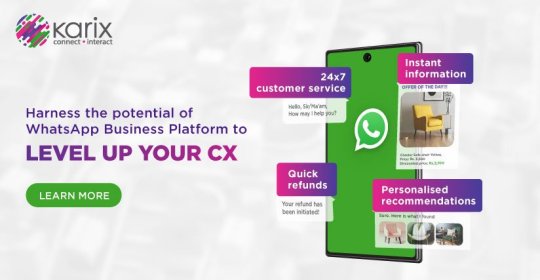
The WhatsApp messaging service is currently creating a lot of business buzz and for good reason. WhatsApp has quickly become the preferred messaging app for over a billion users globally.
WhatsApp Business API’s Possibilities The WhatsApp platform has enormous potential, which is why developing companies all over the world are excited about it. The WhatsApp Business API enables developers to create entirely new experiences that better engage customers and reach more people in more areas across the world. The point at which the business transitioned from a messaging service aimed at consumers to a possible marketing toolbox that can boost the company’s chances via the WhatsApp Business API. Here are some of the reasons why modern businesses should think about adopting WhatsApp Business for customer communications:
Real-time customer assistance can help you automate customer interactions. Businesses may improve and boost productivity by automating customer interactions such as order confirmations and appointment booking with the WhatsApp Business API. Customers want to have real-time discussions with businesses rather than just responding to one-way messaging from brands. WhatsApp solves this challenge by offering a global, dependable two-way messaging service. The WhatsApp Business API also allows businesses to boost customer engagement by delivering real-time customer care.
Sending promotional messages and disclosing product information Compliance issues and maintaining compliance with current national regulations are continual hurdles. One of WhatsApp’s most significant advantages is that it uses end-to-end encryption and prioritizes user privacy. Businesses can use the WhatsApp Business API to send personalized messages to a large audience through marketing campaigns. Additionally, retail organizations can use the WhatsApp Business API to provide updates and product information to customers to improve sales. In addition, it can aid in gathering user ideas and comments, which can help to maximize product development and customer pleasure.
Offering promotions and discounts, as well as reminding customers to make payments. Businesses can use the WhatsApp Business API to offer promotions and discounts, resulting in increased revenue and client retention. It can also help healthcare providers and service-based organizations increase efficiency by sending appointment reminders. Using the WhatsApp business API can also assist financial institutions in reminding consumers to make payments, reducing late penalties, and improving cash flow. Conducting market research and communicating delivery status updates: Businesses can use the WhatsApp Business API to do market research, which allows them to obtain critical information about client preferences. Most businesses want to improve brand interactions with customers. WhatsApp delivers on that promise by providing businesses with a private, secure platform for communicating directly with customers. By using the WhatsApp Business API to offer shipment and delivery updates to clients, you may reduce customer queries and boost customer satisfaction. It also supports a wide range of languages, allowing businesses to provide customer service in the language of their choice. Businesses that use WhatsApp Business API to boost their multichannel customer engagement framework Retail Retailers can utilize the WhatsApp Business API to improve their customers’ shopping experiences, provide order updates, and assist with customer service. These features can improve the customer experience, reduce queries, and enhance income. Healthcare Medical providers can use the WhatsApp Business API to communicate lab results, remind patients to arrange visits, and have real-time conversations about their health. Finance Financial institutions can use the WhatsApp Business API to update their customers on their accounts, alert them about suspected fraud, and provide secure two-factor authentication. These features can improve security, speed up payment processing, and gather important information about client needs. E-commerce Because they rarely meet with clients in person, e-commerce businesses require their online interactions to be swift and productive. E-commerce companies can improve their customers’ buying experiences by mapping their journey, finding opportunities at each stage, and delivering personalized customer assistance via instant messaging networks.
Food and Beverages Industry The food and beverage industry can use the WhatsApp Business API to deliver order confirmations, make offers and discounts, and provide real-time customer service. Businesses can use the WhatsApp Business API to provide menu changes, make customized recommendations, and collect client feedback, all of which boost customer satisfaction and help businesses provide better products.
For More Info:
https://www.karix.com/products/whatsapp-business-api/
WhatsApp Business Solution, WhatsApp Business API Provider, WhatsApp Marketing,
#WhatsApp Business Platform#whatsapp business api messaging#whatsapp business api india#whatsapp api messaging platform#whatsapp business message platform#whatsapp business api provider#whatsapp message api#shopify whatsapp integration#WhatsApp Business features#WhatsApp automated message#WhatsApp Business Account#whatsapp business api integration#whatsapp api integration#whatsapp business api documentation
0 notes
Text
Expert E-Commerce Website Development In USA
In today's digital landscape, establishing a robust online presence is crucial for business success. Kushel Digi offers custom eCommerce development services designed to drive growth and enhance customer experience. By leveraging the latest technologies, they ensure the creation of seamless and scalable online stores tailored to meet the unique goals of modern businesses.
Comprehensive E-Commerce Services
Kushel Digi provides a wide array of services to cater to diverse business needs:
Custom E-Commerce Development: They deliver tailored solutions, building scalable online stores with strong platform architecture and personalized features.
Store Design & Development: Focusing on excellent website design, they create user-centric layouts coupled with high-performance development, offering customizable designs that align with your brand identity.
Platform Migration: Simplifying the transition process, they offer data migration support and smooth process integration, ensuring minimal downtime during platform changes.
Third-Party Integration: Enhancing efficiency through simplified API integrations, they connect CRM & ERP systems and implement secure payment gateway solutions.
Mobile E-Commerce Solutions: Recognizing the importance of mobile commerce, they develop mobile-optimized stores with responsive designs, ensuring cross-platform compatibility for an excellent shopping experience.
E-Commerce SEO & Optimization: Implementing on-page SEO best practices, they focus on site speed improvements and enhanced search visibility to increase conversion rates.
Proven Success Stories
Kushel Digi's expertise is reflected in their successful projects:
Black Rhino Concealment: Achieved a 35% increase in sales, a 22% improvement in average page speed, and a 40% boost in revenue.
KICK-EEZ: Experienced a 35% rise in sales, a 22% enhancement in average page speed, and a 40% increase in revenue.
Sights & Scopes: Saw an 80% growth in sales, a 120% surge in conversion rate, and a 140% uplift in order value.
Slides 365: Noted an 80% increase in sales, a 120% improvement in conversion rate, and a 140% rise in order value.
Leveraging Leading E-Commerce Technologies
Kushel Digi utilizes top eCommerce platforms to build robust online stores:
Shopify: An all-in-one platform simplifying online business operations and offering seamless shopping experiences.
Magento: Known for its flexibility, it allows businesses to unlock extensive customization features, ideal for medium to large enterprises.
BigCommerce: Offers scalable solutions supporting multi-channel selling, secure transactions, and customizable designs, making it suitable for reaching a global audience.
WooCommerce: Transforms WordPress sites into fully functional online stores with user-friendly interfaces.
Commitment to Client Success
Kushel Digi is dedicated to providing custom eCommerce development services that not only drive growth but also enhance the customer experience. By utilizing the latest technologies, they ensure the creation of seamless and scalable online stores tailored to meet the unique goals of modern businesses.
Embarking on your eCommerce journey with Kushel Digi means partnering with a team committed to your business's growth and success. Their comprehensive services and proven track record make them a trusted choice for businesses aiming to establish or enhance their online presence.
Visit more :- https://www.kusheldigi.us/
#Custom eCommerce Development#Store Design & Development#Platform Migration#Mobile eCommerce Solutions
2 notes
·
View notes
Text
Get custom Shopify API integration services
Boost eCommerce sales with custom Shopify API integration services expertly crafted to streamline operations and enhance customer experience.
custom shopify api integration services, custom shopify api integration solutions, shopify pos integration services, shopify payment gateway integration service, shopify erp integration services, social media integration services, pim integrations services, shopify integration for chatgpt, shopify integration company, how can i integrate my shopify app
#ShopifyAPI#EcommerceSolutions#CustomIntegration#ShopifyAPIIntegration#EcommerceDevelopment#CustomShopifySolutions#CustomEcommerceSolutions#ShopifyDevelopment#APIIntegration#EcommerceExpertise#ShopifyExperts#CustomShopifyAPI#EcommerceIntegration#ShopifySolutions#CustomShopifyAPIIntegrationServices#HireCustomShopifyAPIintegrationServices#CustomShopifyAPIIntegrationServiceCost#YouTube#art#landscape art#digital illustration#digital sketch#digital drawing#digital painting#digital art
2 notes
·
View notes